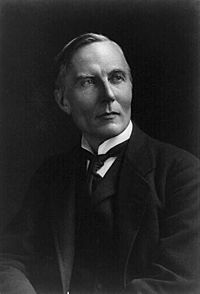H. A. L. Fisher facts for kids
Quick facts for kids
Herbert Fisher
|
|
|---|---|
 |
|
| Member of Parliament for Sheffield Hallam |
|
| In office 23 December 1916 – 14 December 1918 |
|
| Preceded by | Charles Stuart-Wortley |
| Succeeded by | Douglas Vickers |
| President of the Board of Education | |
| In office 10 December 1916 – 19 October 1922 |
|
| Monarch | George V |
| Prime Minister | David Lloyd George |
| Preceded by | The Marquess of Crewe |
| Succeeded by | E. F. L. Wood |
| Personal details | |
| Born |
Herbert Albert Laurens Fisher
21 March 1865 London |
| Died | 18 April 1940 (aged 75) London |
| Nationality | British |
| Political party | Liberal |
| Spouse | Lettice Fisher (1875–1956) |
| Relatives | Herbert William Fisher (father) Florence Henrietta Fisher (sister) Edmund Fisher (brother) William Wordsworth Fisher (brother) Charles Dennis Fisher (brother) Edwin Fisher (brother) Mary Bennett (daughter) |
| Alma mater | New College, Oxford |
Herbert Albert Laurens Fisher (born March 21, 1865 – died April 18, 1940) was an important English historian, teacher, and politician. He was a member of the Liberal Party. From 1916 to 1922, he served as the President of the Board of Education in David Lloyd George's government.
Contents
Early Life and Education
Herbert Fisher was born in London. His father, Herbert William Fisher, was an author. Herbert went to Winchester school and then to New College, Oxford University. He did very well in his studies, graduating with top honors in 1888.
Fisher's Career and Achievements
After university, Fisher became a history teacher at the University of Oxford. He wrote several books about history, including Bonapartism (1908) and Napoleon (1913). These books helped people understand more about European history.
From 1913 to 1917, he was the Vice-Chancellor of the University of Sheffield. This meant he was in charge of running the university.
Becoming a Politician
In December 1916, Herbert Fisher was elected as a Member of Parliament (MP) for Sheffield Hallam. He then joined the government led by Prime Minister David Lloyd George. He became the President of the Board of Education. This was a very important job because he was in charge of schools and education across the country.
Changing Education in Britain
In this role, Fisher helped create the Education Act 1918. This new law made it mandatory for children to attend school until they were 14 years old. Before this, many children left school much earlier. This act was a big step forward for education in Britain. He also helped pass a law in 1918 that gave pensions to teachers, making sure they had money when they retired.
In 1918, he became an MP for the Combined English Universities.
Later Life and Legacy
In 1926, Fisher left politics to become the warden of New College, Oxford, his old university. He stayed in this role until he died. While there, he wrote a major three-volume book called A History of Europe in 1935.
He was also involved with many important organizations, such as the British Academy, the British Museum, and the BBC. In 1927, he won the James Tait Black Memorial Prize for a biography he wrote. In 1937, he received the Order of Merit, a special honor given by the King.
In 1939, as World War II began, he became the first chairman of a special group that decided cases for Conscientious Objectors. These were people who refused to fight in the war for moral or religious reasons.
Herbert Fisher died in London in April 1940. He was hit by a truck during the wartime blackout and passed away from his injuries.
A Secret Wartime Story
Interestingly, some of Herbert Fisher's belongings were used in a secret British plan during World War II called Operation Mincemeat. This operation aimed to trick the enemy. British intelligence officers created a fake dead soldier and dressed him in clothes, including some of Fisher's old underwear. They then placed fake secret documents on the body. The plan worked, and the enemy was fooled by the false information.
Family Life
In 1899, Herbert Fisher married Lettice Ilbert, who was also an economist and historian. They had one child, a daughter named Mary Bennett, who became an academic.
Portraits
There are several portraits of Herbert Fisher. A drawing by Catharine Dodgson and an oil painting by William Nicholson are displayed at New College, Oxford. The college also has a painting by Berthe Noufflard that shows Fisher with his wife, Lettice, and their daughter, Mary.
See also
- Frederic William Maitland
- Henry James Sumner Maine
- Paul Vinogradoff
- Liberalism in the United Kingdom
Images for kids
 | Tommie Smith |
 | Simone Manuel |
 | Shani Davis |
 | Simone Biles |
 | Alice Coachman |


